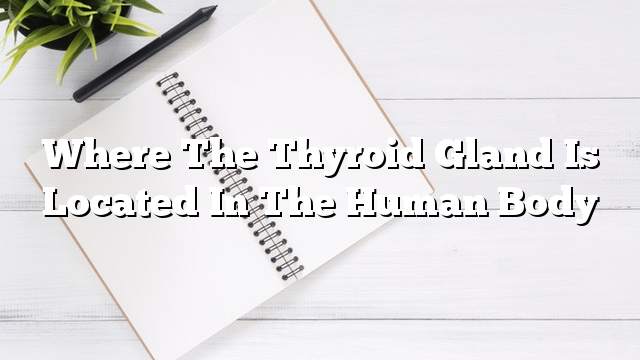Thyroid
The Thyroid Gland is one of the most important human body glands that controls the functions of all organs of the body. It is one of the largest endocrine glands in the human body, producing two hormones: the first hormone is called thyroxine, which contains four atoms of iodine, so called (T4), and the second hormone called triiodothyronine (Triiodothyronine) Contains three atoms of iodine called (T3), and these hormones are necessary to maintain the balance and work of each cell of the body well, as they are produced by the thyroid directly into the bloodstream and not from the ways of special channels, similar to all endocrine.
Thyroid location
The thyroid gland is located in the lower anterior part of the neck below the larynx. It takes the shape of the butterfly when its wings are separated. Its adult weight is between 10 and 20 g. Its color is dark brown and slightly reddish. The thyroid gland consists of two parts; one right and the other left, separated by a thin layer of the Isthmus Tissue, and contains several follicles, which include the cells of the capsule surrounded by a layer of the thyroid gland. These cells secrete thyroxine and triiodothyronine responsible for Cell metabolism processes in the human body.
Thyroid functions
The main role of the thyroid gland is to regulate the metabolic process in the human body. The thyroid gland maintains the metabolic speed of the body through the secretion of thyroid hormones, which are produced from the extraction of iodine from the blood and its integration into the thyroid hormones. The thyroid cells are unique The thyroid gland is controlled by both the pituitary gland and the hypothalamic gland. When thyroid hormones are low in the blood, the hypothalamic gland secretes the hormone TRH, which stimulates the pituitary gland to produce thyroid stimulating hormone (TSH) The gland responds This hormone regulates oxygen consumption, improves respiration rates, keeps the heart rate within normal state, and thyroid hormones play an active role in stimulating growth hormone. , And the development of the brain of the fetus during pregnancy, in the event of disorders in the thyroid gland in the mother, this may cause permanent deformities in the brain of the fetus.
Thyroid disorders
Goiter
(Goiter), a deficiency of thyroid hormones due to iodine deficiency in the body as a major cause, and may be the cause of inflation for genetic reasons, or autoimmune diseases such as Hashimoto disease, or the result of tumors, and treatment of hyperthyroidism based on research on the cause of inflation In the case of iodine deficiency, the patient is given a diet containing iodine, but in the case of a disease is immune immunity is given to the patient thyroid hormones as tablets.
Increased or hyperthyroidism
(Hyperthyroidism), which is the secretion of the thyroid hormone to the hormones in the blood quantity is greater than the normal rate, called this case of thyroid poisoning.
The symptoms of this situation: the sharp decline in weight, despite the patient’s intake of large amounts of food, increased sweating, accelerated heartbeat, and inability to tolerate excess heat, and change mood to severe and nervous, shaking in the hands, with a sharp in the eyes, In the muscles of the arms and thighs.
The disease is caused by two causes: Graves’ disease, caused by an imbalance in the human body’s immune system, which results in a significant increase in the production of thyroxine, the most common condition in young women. Tumors and tumors occur in the gland itself.
The treatment of this disease is in several ways, including: Drug therapy by taking an anti-thyroid (Methiazol), which interferes in the secretion of the thyroid itself. The second method is the use of radioactive iodine, which stops the secretion of thyroid hormone. However, this method leads to a deficiency of thyroid secretion, which should be replaced by drugs throughout life, and it is not recommended to give radioactive iodine to pregnant or breastfeeding women. The most recent method of treating hyperthyroidism is through surgical removal of most thyroid gland. This procedure should be performed by a specialist doctor because of its complications: damage to the glands surrounding the thyroid gland, lack of calcium in the body, and damage Which affect the nerves that control the vocal cords resulting in hoarseness.
Lazy or lack of thyroid secretion
(Hypothyroidism), which is the lack of thyroid production of hormones in sufficient quantity of the body, and the causes of this disease immune diseases in the body, surgical operations of thyroid gland, and radiation therapy. The disease is diagnosed by a simple blood test to determine the proportion of thyroid stimulating hormone (TSH).
As a result of the reduction of thyroid hormones in a large amount in the human body, the biological processes will slow down significantly, leading to increased body weight, and the feeling of human cold because of the lack of burning, the feeling of tiredness, dry skin, and memory weakness, in addition to depression.
Treatment is done by taking the thyroxine replacement pills to compensate for the deficiency and its effects on the body. This medicine is at certain rates and criteria determined by the physician based on laboratory tests.
Thyroid cancer
Thyroid cancer is a cancerous growth of the thyroid glands that includes four types: papillary, follicular, medullary, and anaplastic.
